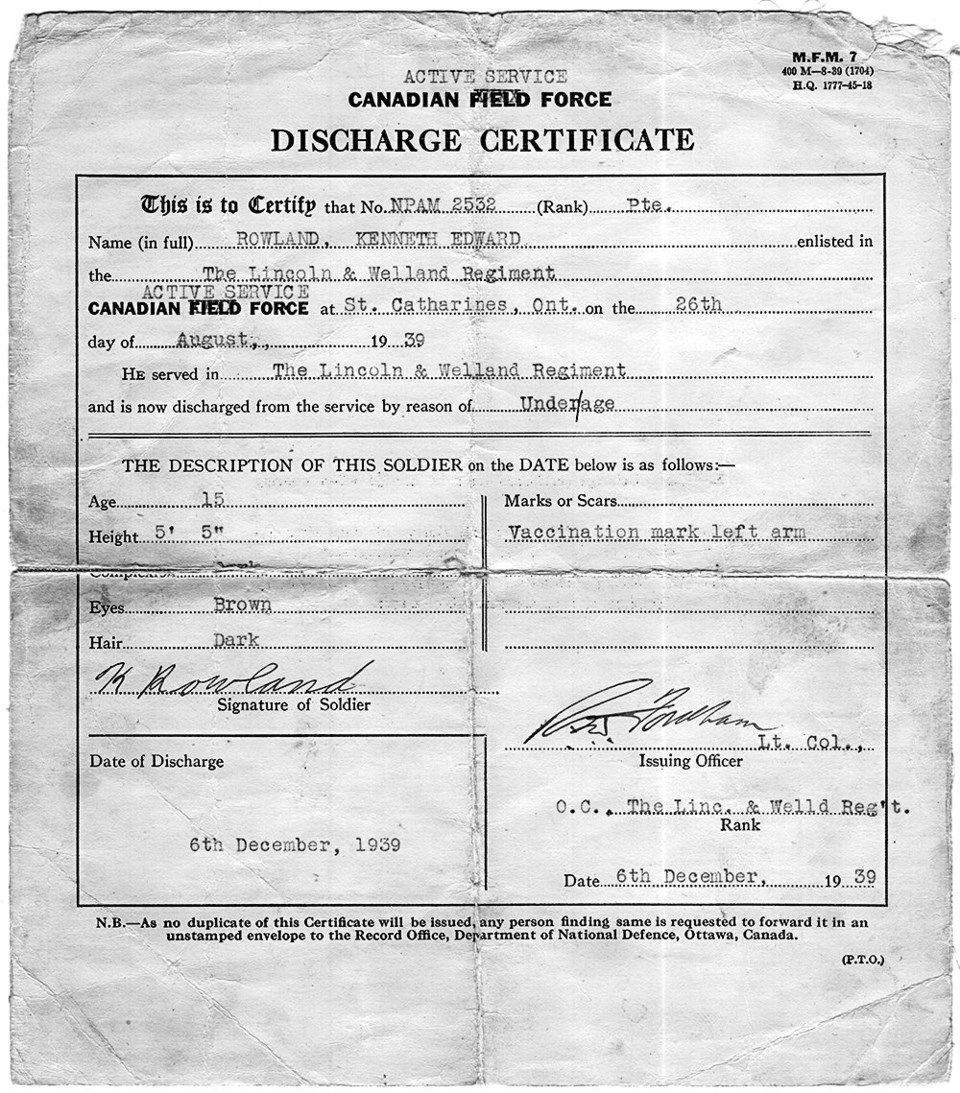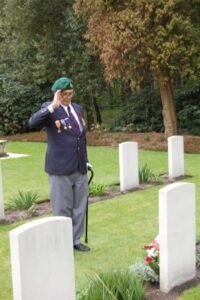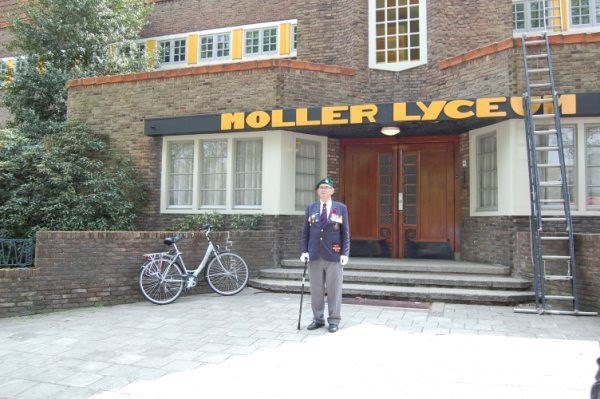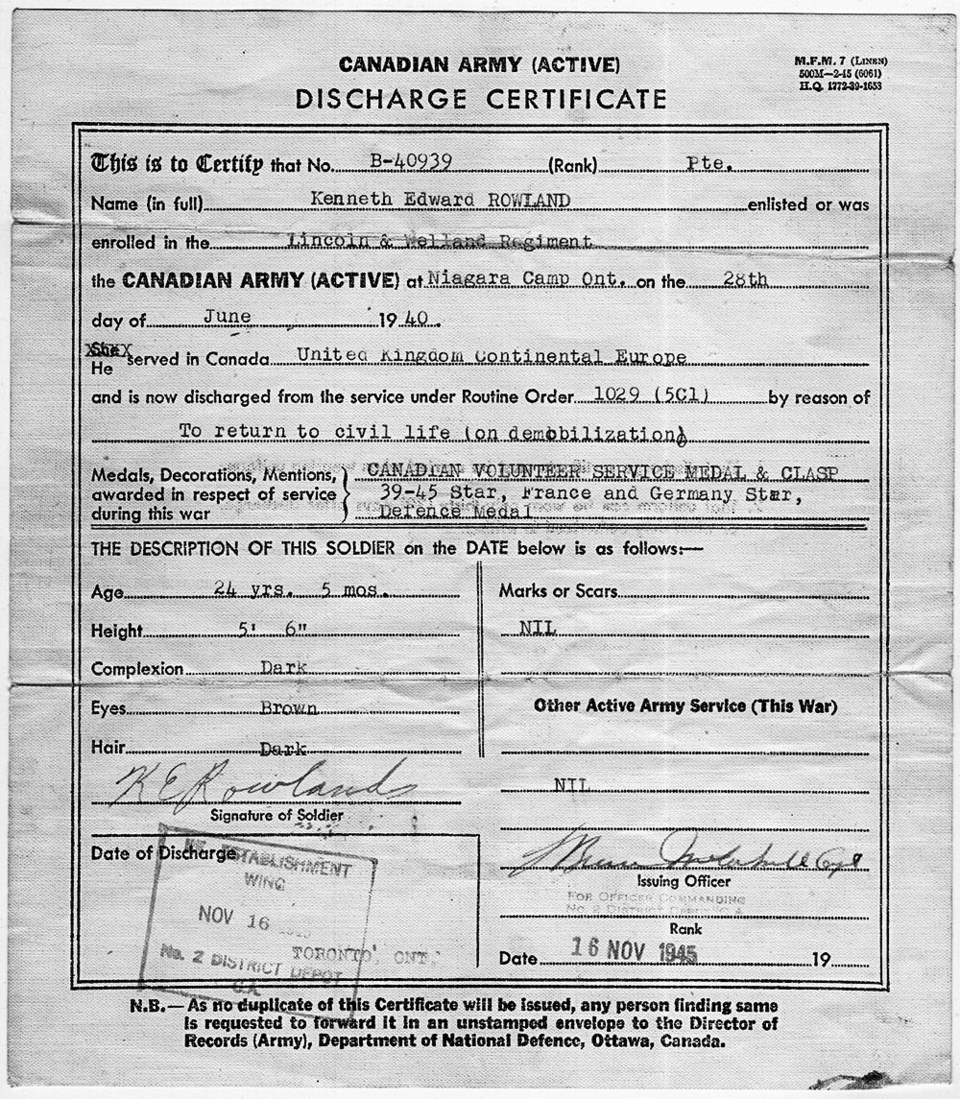A special Remembrance Day reader contribution
BY KENDRA BROADLEY
Special to the Voice
My prayer before I went to Holland was that the time my two sisters and I spent with our father, Ken Rowland, would be a time of reconciling the past with the present. I prayed that some of the more horrific memories Dad had of war would be healed by God’s grace and mercy. Little did I know what He had in store for us on this journey to the 65th anniversary of the liberation of Bergen op Zoom.
Looking back now, I realize how naive we were. We went to a foreign country where none of us spoke the language, expecting to be able to find places Dad hadn’t seen in over 65 years. Of course, we knew things would have changed but we really had no idea of what we were doing.
Before we left we rented a car and booked a cottage for a week in Ooltgensplaat, on the island of Goeree Overflakkee, close to Bergen op Zoom. We knew that many of Dad’s hardest memories happened in that area and one thing he really wanted to do was find the school where his best friend was shot and killed by a sniper who was aiming for Dad. He also wanted to visit Kapelche Veer, where he spent five horrific days in a slit trench and three of his partners were seriously wounded. Another area with difficult memories was the tiny village of Bokhoven, where nine men rowed across the Maas River in December of 1944 and only one survived.
Dad was there that night, a part of an operation that went horribly wrong. For 66 years Dad had carried the guilt of being a survivor when many good men and boys around him didn’t get that chance.
We arrived safely in the village of Ooltgensplaat on May 1, 2010, the Queen’s birthday, and a time of celebration in The Netherlands. The next day we took off for Bergen op Zoom and our trusty GPS took us right to Grote Markt, the square where the de Draake Hotel was. Dad’s regimental headquarters was housed in the de Draake while the town was being liberated. Dad’s job as communications signaller was to run a telephone wire with his partner Roscoe from the headquarters to the school house where his company was located.
We walked from the hotel down the street trying to follow the same path as Roscoe and Dad had on October 28, 1944. In Dad’s detailed memory it had been about a 10 – 15 minute walk and as we walked he remembered that the townspeople had come out of their houses, laughing and shaking their hands, offering them drinks and hugs and kisses. Dad remembers Roscoe going into a house with one of the girls to get a drink from her father. The mood was joyful because the liberators had arrived.
But while they were running the wire, the orders had changed and the commander had moved the company from the school to another area so the artillery could fire upon the houses across the street from the school to clear the enemy. Unaware of these changes, they arrived at the school and Dad climbed a fence in a hedge to hang the wire in a tree at the back of the schoolyard. As Dad called down to Roscoe to throw up the wire he saw the leaves just above his head being hit by machine gun fire. He jumped down and saw Roscoe drop to the ground. At the same time their own artillery opened up on the houses across the street with bombs. Roscoe had been hidden by a hedge but as Dad jumped down to avoid the machine gun fire, the machine gun also moved down and hit Roscoe. Dad held Roscoe in his arms as he died from a wound to the throat.

When we had walked the required 10-15 minutes it took Dad and Roscoe to get to the school, the area started to look familiar to Dad and we looked around for a school. There happened to be one a little ways down the street but Dad said it wasn’t right. There didn’t seem to be a yard where it should have been and the street wasn’t right. My sisters and I tried to tell him that things could have completely changed in the 65 years since he had been there. The street could even have been realigned but Dad insisted that even though the area seemed right, it wasn’t the same school.
We looked around for a bit and asked a couple of people but finally decided to let it go for the day as we would be coming back a couple of days later and we would look again then.
As we were getting a picture of Dad in front of the de Draake hotel a young man of 18 years tentatively walked over to us holding his chest. He was having difficulty breathing and as he spoke to Dad he choked up and tears started running down his face. He breathlessly told us that he had noticed Dad’s beret with the regimental badge, and that he was a Lincoln and Welland Regimental reenactor. In fact he was in charge that week of setting up a mock camp by the Lincoln bridge (named after Dad’s regiment after the war). He shook Dad’s hand and said it was his dream to actually meet a Lincoln and Welland veteran. We took down his contact information and told him we would try to get back to see the camp a couple of days later. This first “chance” encounter would be a reminder throughout our trip that God was with us on this journey of healing and that he would provide what and who we needed along the way.
That afternoon I called the phone number of a man, known to one of Dad’s friends in Canada. Marius told me on the phone that he was an expert on the history of Kapelleche Veer, which was one of the places we wanted to visit and he said he would take us there the next day. Marius also was involved in an organization called “Friends of Allied War Graves,” and had been finding information for the families of the eight men who had drowned while crossing the Maas river near Bokhoven. He didn’t know that Dad was involved in that operation and Dad was able to provide some new information and to share his story of that terrible night with Marius.

In opening up about that night for the first time in 65 years, Dad felt a huge weight lift. We visited the graves of two of the young men whose bodies were found a year after they drowned, and another chapter of the story was put to rest.
Before we left Canada we had arranged to meet with Kees and Riet. Riet had been a young girl living in Bergen op Zoom during the war, and Kees was a friend of her deceased husband, who spoke English. We had hoped that Riet might be able to help us find the school but because she didn’t speak English, Kees would be our interpreter. Kees also had a friend who lived in Capelle (the village near Kapelleche Veer) during the war and he met us at the memorial with his nephew and their wives. While standing on the dyke Dad told us how B Company ran onto the dyke in the dark with thick smoke laid down by their own artillery to hide them from the enemy, some of whom were on the dyke with them, and many who were across the Maas River to the north. We had learned from Marius that over 50 men were sent off the dyke with smoke poisoning that night.
It was January 26, 1945, with two feet of snow and they wore white cotton snowsuits for camouflage. Dad spoke of dropping to his knees (he was carrying the 40-pound radio on his back) while his partner opened the back of the radio where the controls were, to tune in the right frequency. At that moment three grenades were thrown at them. One Dad kicked over the side of the dyke where it exploded and two exploded close to them, wounding his partner. As Dad took out his shell dressing to bandage his shoulder, he cried out for the medic. After the war Dad learned his friend had lost a leg.
Dad ran up the dyke and jumped into an empty enemy slit trench. When the smoke cleared, his company commander called out looking for his men. Dad called out that he was alone and another man was sent to him. They would take turns peeking over the top of the dyke and every time they did they were fired upon with machine gun fire. At one point, Dad turned to look at his new partner who had been with him for 15 minutes and saw that he had been shot right through the mouth. The bullet had gone in one side of his face and out the other without touching teeth or jawbone. Dad bandaged him up and again called the medic.
After this we had a private memorial service and a minute of silence remembering the 50 men killed and over 200 men wounded during those five days. We then went back to our new friend’s home to share coffee, pastries, and wonderful Dutch hospitality.
Later that day Kees and Riet took us to find the school in Bergen op Zoom. They drove to the same area that we had walked to a few days earlier and took us to another school. Again Dad was adamant that this was not the school he remembered even though we again tried to convince him that everything was changed and wasn’t there a possibility that this was it? He didn’t think so...and if he couldn’t rest easy about it we realized we couldn’t push the issue.
The next day was the Remembrance ceremony in Bergen op Zoom, and to our surprise Prime Minister Harper and the Prime Minister of Holland attended. Also attending, and of greater importance to us, was our young friend Bas and some of his friends from the reenaction group.
After Dad laid flowers and an information page on Roscoe at his grave, Bas said that he would continue to care for the grave and make sure there were fresh flowers there. Bas also told us that his friends thought they knew where the school was. We headed out in two cars (Bas with us, and his friends leading) and ended up again at the same spot we had walked to that first day. Dad again told the story of Roscoe’s death and Walter who was the father of one of the reenactors and who had lived in the town his entire life very quietly said there was another school just down the street that faced north and in 1944 had a large field attached to it. We walked about three minutes down the street and looked at the school. This time, Dad tentatively said, “This could be it.”

A large addition had been added to the school where the field once stood. Bas told us that his little brother now went to that school and that there was a courtyard inside that contained the back wall of the original building. Unfortunately it was the first week of their two-week spring holiday and the school wasn’t open. Fortunately what we may think are major difficulties are nothing when it comes to God! As we walked back towards the front of the school a man opened the door and walked out. Pauline (one of Bas’s friends) asked him if we could go into the school and explained why. He was the vice-principal and he kindly let us in. As we walked into the courtyard, Dad looked at the wall of the school and said, “This is it! I remember those windows!”
We were all so happy and Dad most of all. Once again painful memories were put to rest and Dad felt a measure of peace.
The next day we left our cozy cottage in Holland and made the journey to Maldegem, Belgium. We arrived around noon and went to our hotel even though the reservation was for 3 PM. We were hoping we could get in early. Unfortunately there was no one around and so we picked up some brochures of attractions in the area. One advertised a Canadian War Museum that we had never heard about. We decided to go and see it and this was another “chance encounter” that led to new friendships and more stories that needed to be told.
The owner and curator of the museum met us and told us how the museum came to be. When he announced to the people of the area that he was starting a museum they began bringing him uniforms, guns, radios, spent rocket shells...anything and everything used by Canadian, Polish, and German soldiers during the war. He even had five tanks given to him that had been buried in a farmer’s field.
It seemed that during the war when the soldiers had been stationed in the town and surrounding areas the townspeople got to know them and love them and when they went out on the battlefields and were killed or wounded or eventually moved on to the next battle, the townspeople would go out and collect whatever was left as mementoes or in the hope that they might return for them someday.
Dad was thrilled to see the radio he had carried on his back in action, something he hadn’t seen since the war, not even in the Canadian war museums in Ottawa or Kingston. The museum curator (Gilbert) had a great love and passion for his work. This was evident in the way he moulded the faces of the mannequins in the museum to resemble the pictures of faces of young soldiers given to him by the townspeople and by visitors to the museum over the years. He invited us to send a picture of Dad’s face from the war and even one of Roscoe, and he would make sure to make a mould resembling them both that would also go into his museum.
Before we left I asked Gilbert if he could direct us to the Leopold Canal, where there had been heavy fighting and many casualties. This was another place Dad very much wanted to see. He started to give us directions and then said, “Let me call someone for you.”
He handed me the phone and I found I was talking to a volunteer guide of the battlefields of the Flemish “Flanders Fields.” Iris and her husband Daniel picked us up a few hours later to take us to not only the Leopold Canal but also to another canal which Dad again had crossed in the middle of the night and met up with enemy fire on the opposite side. One of his fellow signallers was hit by a rocket in the back right below his radio set and there was a memorial with his name on it at this site. Dad remembered him as a quiet young man who told the medic who was attempting to bandage his wounds, to take off his watch and send it to his mother back home as he wasn’t going to make it.
The next day we visited the Canadian memorial graveyard where he was buried and laid flowers and a Canadian flag on the grave.
That same evening Iris and Daniel took us right to the barn where 66 years before Dad had fired 100 rounds to protect his company from a sniper firing on them while they were standing in a mess line for supper. We met the Flemish man whose family had owned the farm during the war, and who still lived there with his wife. He confirmed that this was the spot where the company had set up their mess kitchen.
As I reflect back on our experiences in Holland and Belgium I am amazed, delighted, and humbled by God’s answer to our prayers to be able to see Him at work, providing what and who we needed when we needed them.
One of the final experiences we had in Holland came as we had given up our car at the airport and were attempting to take the train into Amsterdam for our final night. We were in a hurry as the train was leaving and we jumped onto the wrong one. Instead of going to the central station downtown where our hotel was, this train was heading in another direction. By this time, I was prepared for whatever experience God would bring to us. The young man in the seat across from us told us where to get off to make the right connection back to the central station and even what platform to go to. There was an older couple behind us who we found out also had gotten on the wrong train as I heard them also getting directions from their seatmate. When we got off the train I asked them what directions they had been given and they said they were told to get off when we did and then to follow us! Not only had God provided for us, He had provided for them as well!
While we were on the second train heading to our hotel, a young woman came over to us and sat down. She began thanking Dad for his sacrifice during the war to free her country from occupation and she became quite emotional, saying that her parents and grandparents had shared stories of that time and what the Canadians had done for them in the liberation. This was another part of Dad’s healing journey, to know that although the sacrifice was great, and the memories were hard...there was freedom for many as a result and many lives were saved and enriched because of the sacrifice of the allied forces.
The peaceful, beautiful, flower-filled fields of Holland and Belgium and the friendly, smiling faces of their people had brought healing to the painful memories as much as the retelling of the stories and the visiting of the battlefields did.



